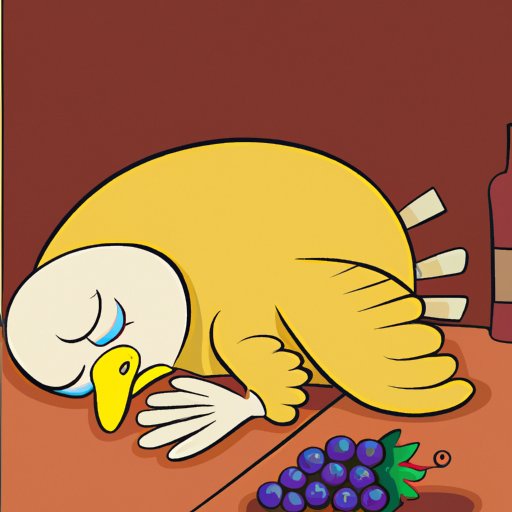
Introduction
Have you ever noticed feeling especially drowsy after eating turkey? It’s a common experience for many people, and has given rise to the idea of the “turkey coma,” or “food coma,” after a big Thanksgiving meal. But is there any truth to the idea that turkey makes us sleepy? In this article, we’ll dig into the science behind post-Thanksgiving naps and explore what it is in turkey that may contribute to our feeling drowsy.
The Science Behind Turkey’s Sleep-Inducing Properties
One of the most commonly cited reasons why turkey may make us sleepy is the presence of tryptophan, an amino acid that is used by the body to produce serotonin, a neurotransmitter that helps regulate sleep and mood. According to this theory, eating turkey (which is high in tryptophan) leads to an increase in serotonin, which in turn can make us feel drowsy and relaxed.
While this explanation sounds plausible, the science behind it is more complicated. For one thing, tryptophan is present in many other foods besides turkey, such as chicken, cheese, and eggs. And while it is true that tryptophan can be converted into serotonin, it’s not necessarily the amount of tryptophan that matters.
A study published in the Journal of Clinical Psychopharmacology found that while tryptophan can indeed increase sleepiness, it only does so when taken on an empty stomach and in the absence of other amino acids. In other words, when we eat a normal meal that contains protein, the effect of tryptophan on serotonin levels is minimal.
So while it’s true that turkey contains tryptophan, it’s not clear whether it’s enough to cause the drowsy feeling that many people experience after eating it.
Is Tryptophan in Turkey Really the Culprit for Post-Thanksgiving Naps?
Given that the science behind tryptophan’s role in sleepiness is somewhat inconclusive, it’s worth exploring other factors that may contribute to feeling drowsy after eating turkey. One potential culprit is carbohydrates.
Carbohydrates, which are found in many Thanksgiving staples like mashed potatoes and sweet potato casserole, can cause a spike in insulin levels that can leave us feeling tired. When we eat carbs, our body releases insulin to help convert the glucose in the food into energy. But if we eat too many carbs or the wrong kinds of carbs (such as refined sugars), our insulin levels can spike and then crash, leaving us feeling fatigued.
So while tryptophan may play a role in post-Thanksgiving sleepiness, it’s possible that other factors like carbohydrates are playing a bigger role.
Food Coma 101: Understanding Why We Feel Sleepy After a Turkey Meal
But why do we feel so sleepy after a big meal, anyway? Whether it’s due to tryptophan, carbs, or some other factor, there’s no denying that many people experience a feeling of drowsiness after eating a big Thanksgiving dinner. Here are a few possible explanations:
- Stress: Cooking a big meal can be stressful, and stress can take a toll on our bodies. When we’re stressed, our bodies produce cortisol, a hormone that can interfere with sleep.
- Alcohol: Many people enjoy a glass of wine or a beer with their Thanksgiving meal, but alcohol can interfere with sleep quality and leave us feeling groggy the next day.
- Low blood sugar: Big meals can cause a drop in blood sugar levels, which can make us feel lethargic and tired.
- Diverted blood flow: When we eat a big meal, our body diverts blood flow to the digestive system to help break down the food. This can reduce blood flow to the rest of the body, including the brain, which can make us feel sluggish and less alert.
All of these factors can contribute to feeling sleepy after a big meal, regardless of whether or not turkey is involved.
Thanksgiving Day Turkey: A Recipe for Drowsiness?
Given all of the factors that can contribute to post-Thanksgiving sleepiness, it’s clear that there’s no one-size-fits-all explanation for why we feel so drowsy after a big meal. While turkey may play a role for some people, it’s important to remember that there are many other factors at play, from the amount of alcohol we consume to the amount of stress we’re under during the day.
Instead of trying to pinpoint a single culprit, it’s more useful to think about post-Thanksgiving sleepiness as a result of the combination of many factors. By understanding these factors, we can take steps to mitigate their effect and stay alert and energized even after a big meal.
5 Tips to Avoid Falling Asleep After Thanksgiving Dinner
If you’re someone who struggles with post-Thanksgiving sleepiness, here are a few tips to help you stay alert and energized:
- Take a walk: After eating a big meal, going for a walk can help get your blood flowing and improve digestion.
- Drink caffeine: If you’re feeling really tired, a cup of coffee or tea can help give you a quick energy boost.
- Stay hydrated: Drinking plenty of water can help combat fatigue and keep your body functioning properly.
- Eat a balanced meal: While Thanksgiving dinner may be heavy on the carbs and protein, it’s important to also include some vegetables and other nutrient-rich foods in your meal to keep your energy levels up.
- Take a nap: If all else fails, taking a quick nap can help you recharge and get back to your day feeling refreshed.
Conclusion
Whether it’s tryptophan, carbohydrates, or some other factor, there’s no denying that many people experience a feeling of drowsiness after eating a big Thanksgiving meal. But by understanding the science behind post-Thanksgiving sleepiness and taking steps to mitigate its effects, we can enjoy the holiday without feeling weighed down and exhausted afterward.
So this Thanksgiving, don’t be afraid to indulge in your favorite foods – just remember to pace yourself and take care of your body so you can enjoy the day to the fullest.





